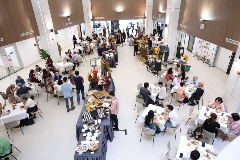NUS Scholar Preston Wong came up with a recipe to save good food from being wasted.
.jpeg?sfvrsn=1fae4527_1)
Mr Wong regularly holds educational tours on sustainability in treatsure’s concept store at the heart of Singapore’s Central Business District. Customers can also pick up surplus goods from the store after making a reservation on the treatsure app.
Unwilling to let the equivalent of 68.4 million plates of nasi lemak end up in the rubbish dump each year, NUS Scholar Mr Preston Wong came up with a recipe to save good food from being wasted.One man’s trash is another man’s treasure. In the ugly fruits and expiring chocolate destined for the landfill, Mr Preston Wong (’16) spotted an eco-business opportunity: treatsure, a food-saving app that connects consumers to surplus food supplies.
The entrepreneur was inspired by the rubbish in his kitchen. An NUS Business School Dean’s Scholar, Mr Wong shared: “In 2016, I witnessed my family members throwing out expiring food from the refrigerator and wondered if something could be created to give the food away instead.”
That small incident ignited big plans for Mr Wong. Together with fellow NUS alumnus Mr Kenneth Ham (’17), he delved into the circular economy, which is an alternative concept to the linear model, where products are discarded after use. Instead, it strives to re-use resources for as long as possible — the fundamental belief that treatsure is built upon.
Launched in 2017, the app rescues and sells excess groceries and foods which would otherwise go to bins. Within three years, it has salvaged over 20 tonnes of food.
"treatsure is a play on the words 'treat' and 'treasure', which conveys our idea to get people to enjoy food while recognising how precious it is. Our mission is to get everyone to treat food as treasure,” explained Mr Wong.
Today, over 30,000 users and 40 merchants answered the app’s rally call. Customers like how they can do their part for the environment while satisfying food cravings at a bargain. They can buy blemished bananas, or grab a takeaway at a hotel buffet nearing the end of mealtimes.
A treatsure user, who only wanted to be known as Ms Alicia, commented, “The reduced prices for groceries, like vegan products, meat and dairy alternatives, was a huge draw. These tend to be very pricey in Singapore. I purchase groceries on treatsure
every few weeks, and I like the idea of being able to help reduce food wastage.”
For treatsure’s partners — grocery suppliers, hotels and restaurants — it is a win-win situation for the environment
and their bottom line. Some of treatsure’s merchants have reported a reduction of 30 percent in food waste.
Within three months of joining treatsure in 2021, e-commerce site Craft Tea Fox saved over 50kg of food items, including expiring dairy-alternative milk and matcha powder in dented tins.
Craft Tea Fox co-founder Mr Elias Tiong shared, “By
having treatsure as an alternative platform for our blemished items or those close to expiry, we’ve managed to significantly reduce wastage of these items, which might have otherwise gone unsold.”
.jpeg?sfvrsn=a8768c5a_1)
To reduce food waste at buffets, treatsure formulated their takeaway buffet-in-a-box, where users can pack food from participating hotel or restaurant buffets in the last 30 to 60 minutes of the buffet timeslot, from just S$10 per box.
“treatsure’s mission is really relevant to us. They’re using technology to solve the problem of food wastage, which is a very widespread and serious problem for food manufacturers and distributors,” he continued.
Bolstered by growing awareness about sustainability issues, the fight against food wastage is gaining traction in Singapore. According to the National Environment Agency, food waste has dipped by 11 percent between 2019 and 2020.
Disrupting the food industry with an innovative solution, treatsure is an app ahead of its time. But the founders faced an uphill task at the start.
“In the earlier stages, we faced rejections by investors and merchants mainly
due to a lack of awareness of how sustainability could fit into a business, as well as uncertainty about how the market would respond to such a product. Customers’ perceptions of the quality of surplus food was also a tall hurdle to overcome,”
Mr Wong recalled.
Through the ups and downs, Mr Wong soldiered on with help from his alma mater. The start-up’s first home was at the on-campus incubator, The Hangar at NUS Enterprise. Whenever he needed advice on his business,
the NUS Business Global Alumni Office linked him up with business school alumni.
As treatsure is a lean team of three, Mr Wong wears multiple hats in sales, marketing, and legal matters. Thankfully, the scholar can fall back on the
solid foundation he had built while at the NUS Business School and NUS Faculty of Law’s Graduate Law Programme.
Having received robust support from NUS, Mr Wong wants to pay it forward the treatsure way. Mr Wong said, “We
regularly give back to the community, at the same time creating a positive impact through reducing food waste. During the height of the pandemic last year, we partnered NGO Migrant Workers’ Centre to distribute surplus snacks and drinks
to over 5,000 foreign workers.”
Just like the closed-loop of the circular economy, kindness is a gift that keeps giving.
This story is taken from the NUS Giving Magazine: Healthier Planet, Happier People edition. Read more giving stories on the Urbanisation and Sustainability efforts in NUS in this publication.






